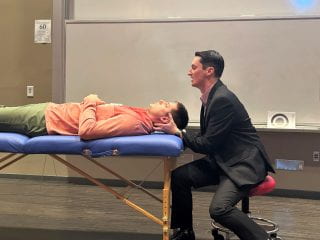Sports medicine experts and students recently converged on Hillside Auditorium for the 18th annual Razorback Sports Medicine Symposium, an interactive summit from the College of Education and Health Professions that helps teach community healthcare providers about best sports medicine practices.
This year’s symposium theme, “An Interprofessional Approach to Sports-Related Concussion Rehabilitation,” saw leading experts lecturing on rehabilitation interventions and other aspects of sport-related concussions.
“Conferences like the Razorback Sports Medicine Symposium are great places to have conversations about how to work as a team to manage a patient’s case, learn about varying perspectives and approaches to care and have a dialogue about how to effectively transition patients through the healthcare process,” said Luzita Vela, Master of Athletic Training program director and teaching associate professor in the Department of Health, Human Performance and Recreation.
A total of 140 participants across various disciplines, including athletic training, physical therapy, occupational therapy and medicine, attended the 18th symposium, the most in the event’s history.
Associate professor R.J. Elbin, who leads the Office for Sport Concussion Research, often publishes research on best practices for concussion rehabilitation and shared some of his findings at the symposium.
Additional expert faculty and practicing professionals from various backgrounds and institutions presented on topics relating to the symposium’s theme, including a team of Inova Sports Medicine Concussion Program members. Inova’s concussion program has extensive training and experience in the clinical management of concussions and a successful track record of working with school districts to overhaul their concussion management plans and policies.
Elbin and the other presenters were able to share their experiences in managing hundreds of sport-related concussions each year. Vela said a main takeaway from the day was that a team-based approach for concussion diagnosis and individualized rehabilitation plans helps athletes feel better and allows them to return to their school, life and sport.
Three of the Inova team members spent the day before the symposium meeting with sports medicine professionals and school district stakeholders to review concussion care models in Arkansas. Christina Dollar, the clinical research coordinator on the Inova team, then met with graduate and undergraduate students to discuss her career path.
The symposium was organized by the Master of Athletic Training Program and sponsored by the Department of Health, Human Performance and Recreation; the College of Education and Health Professions’ WE CARE grant funding; Arkansas Children’s Hospital; Henry Schein Medical Products; and Wright’s BBQ. Several athletic trainers, physical therapists and physical therapy assistants were also provided approved continuing education unit credits.
“We hope to teach our students about the important role that continuing education plays in evolving their clinical practice and provide opportunities for students to disseminate their research and engage in conversations with future colleagues,” Vela said. “This helps them build a community of practice before they have graduated from our program, which greatly helps with their transition into the profession.”

Experts in sports medicine lectured and provided demonstrations at the 18th annual Razorback Sports Medicine Symposium.


